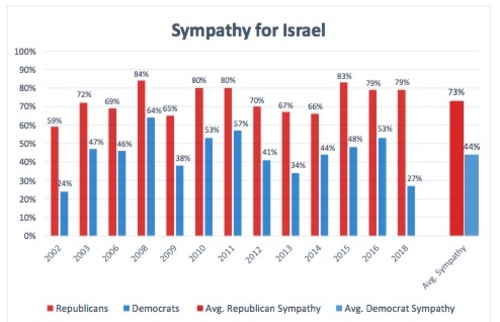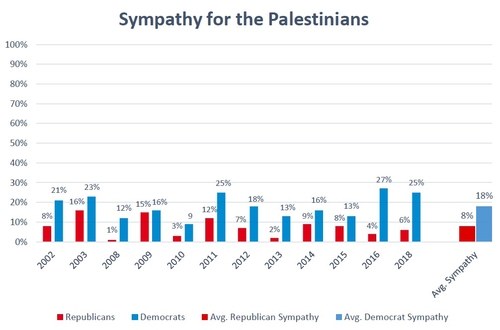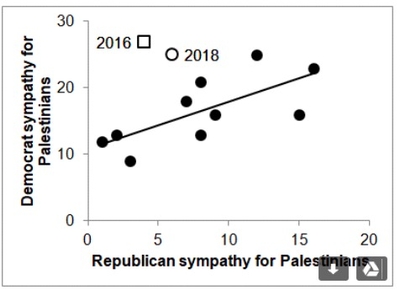A recent Pew opinion survey showing 79 percent sympathy for Israel over the Palestinians among Republicans versus a mere 27 percent among Democrats has aroused a furor in pro-Israel circles. But this sort of ratio has been around through the twenty-first century with little change.
By way of proof, note the 13 opinion surveys I collected between 2002 and 2018 at a blog titled "Republicans and Democrats Look at the Arab-Israeli Conflict." Arraying the surveys together (carefully done by my researcher, Delaney Yonchek), one finds that attitudes remaining consistent within specific bands. Favorable Republican attitudes to Israel range between 59 and 84 percent, averaging 73 percent. Favorable Democrats attitudes range between 24 and 64 percent, averaging 44 percent.

Yes, the 2018 Pew poll does show a wider gap than ever (52 percent) but Republican pro-Israel sentiments have been higher and Democratic pro-Israel views have been lower, so it's well within the 16-year range.
In other words, there is no dramatic shift in outlooks. The pattern of far more positive Republican and less positive Democratic attitudes has been in place for many years. Nothing has happened of late to suggest this pattern will end. Obama and Trump have both done their part to confirm this trend.
It's also worth a look at attitudes toward the Palestinians. Republican sympathy toward them is vanishingly small, from 1 to 16 percent, with an average of 8 percent. Democratic favor ranges from 9 to 27 percent, averaging 18 percent – not exactly a huge number.

Assuming the two parties have about the same number of supporters, ignoring Independents, and averaging their totals, one gets 59 percent of party members favorable to Israel and 13 percent favorable to the Palestinians, a 4.5 to 1 ratio. That in turn fits the average over the decades as established by the Gallup poll.
I'd say Israel stands in good stead in the United States. Yes, it could undergo a collapse of support such as happened in Europe in the aftermath of the Venice Declaration of 1980, but so long as conservative support remains consistent, this remains a distant prospect. (January 31, 2018)
Feb. 1, 2018 updates: (1) Jonathan Tobin notes that the Democratic members of Congress are cool to Israel in part because of their hostility to Trump.
(2) Eugen Tarnow of Avalon Business Systems ran these numbers and produced the two graphs below. He found that sympathy for both Israel and the Palestinians is correlated between Republicans and Democrats, meaning these tends to go up and down together. He explains:
We can see the correlation by plotting the percentage of Republican sympathy for Israel on the x axis and Democratic sympathy on the y axis. A quick glance shows that they move in tandem, forming almost a straight line with the slope of about 40 degrees, with Democrats perpetually about 30 percent less sympathetic.

There's just one exception: in 2018, Democratic sympathies for Israel declined drastically compared to the Republican. This outlier presumably reflects increased polarization: Trump being friendly with Israel, Democrats move in the opposite direction.
Sympathy for the Palestinians is similar, though much lower numbers means the graph has more statistical "noise," which reduces the correlation. Here, sympathy is correlated except for two years, 2016 and 2018. This suggests that Trump has twice disrupted the pattern.

Comment: This analysis has favorable implications for Israel, suggesting that Trump is the cause of the unprecedented rift, and so his passing from the scene should again bring the parties more in alignment.